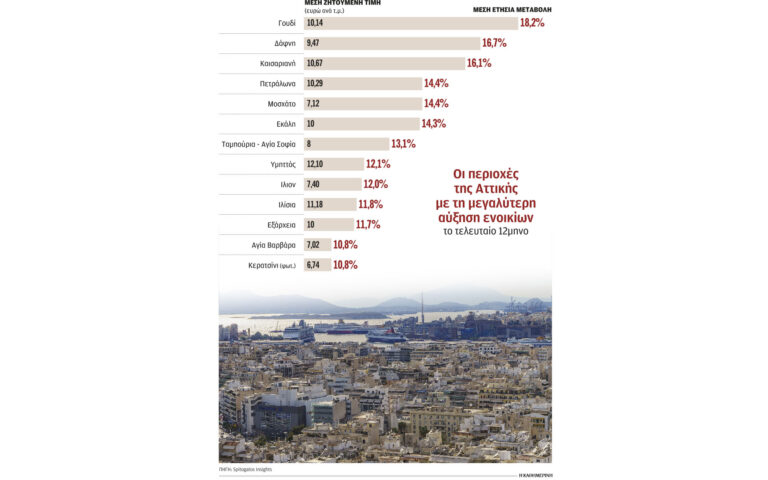The age and poor maintenance of the stock of real estatethe absence of reliable data in the absence of a comprehensive land registerthe bureaucratic procedures in transfer system and the fragmentation of the market, are the main weaknesses of the Greek real estate market, as he points out in his interview with “K” the managing director of the Resolute Asset Management group and president of Resolute Cepal Greece Bill Hancock. The international property management and consulting company manages 175,000 properties in Greece with a total value of more than 25 billion euros and, as Bill Hancock explains, the aim is to improve the efficiency of the properties through the know-how it has, streamlining processes and enhancing transparency in real estate transactions.
– What does the Kaican – Resolute agreement include and what are the benefits of the creation of Resolute Cepal Greece?
– Resolute Cepal Greece (RCG), as a result of the merger of Resolute Greece and Kaican, is the leading property manager in Greece. The agreement positions RCG as the first large-scale and international standard property manager in Greece. In particular, the volume of real estate related to Cepal’s loan portfolios allows the development of a team across the country, which supported by our real estate platform in Greece, REInvest, technology and know-how from our international operations, will introduce new, sophisticated approaches and techniques to both Cepal’s portfolios and other assets managed by RCG. These approaches are integrated with those of Resolute Hellas, which remains separate and independent from RCG. Resolute Hellas is wholly owned by the Resolute group and focuses on providing real estate management and advisory services to the Piraeus Bank group and related clients. While RCG and Resolute Hellas are managed separately, very significant operational benefits arise from the development of technologies, approaches and work models that can be applied to the respective portfolios.

– How many properties does Resolute manage in total in Greece through the corresponding agreement it has concluded with Piraeus Bank?
– Resolute Cepal Greece and Resolute Hellas provide advisory services, asset and real estate management to Cepal, the Piraeus Bank group and a number of local and domestic investors active in the Greek market. In total, we currently advise or manage more than 175,000 properties with a commercial value of over €25 billion.
Greece is increasingly attracting investors worried about volatility in their own markets.
– Given that the portfolio you are going to manage mainly includes properties originating from bad loans, what are the characteristics of these properties and what problems do you have to deal with?
– The key problems in asset management you mention are related to data quality, legality, ownership status and diversity, in terms of type, location and value. Certainly 175,000 properties is a large number. The main challenges are:
a) Data quality: We need accurate data to properly manage properties, but much of what we have is incomplete or out of date. In the absence of a comprehensive land registry, this requires us to undertake bulk data recovery. For our part, we have a team of data scientists, supported by Resolute’s technology company Recognite, to address this issue.
b) Legalization: Most properties have legal and technical issues that limit the possibility of transfer, while a major problem is the lack of sufficient expertise such as engineers, notaries or capacity in local registries.
c) Property Condition: These properties are often neglected and poorly maintained.
d) Different types of assets: The portfolio usually consists of a variety of assets including residential, commercial and land located throughout Greece with very different values.
Regeneration plans are needed in abandoned areas
– Resolute Asset Management has been active in the Greek real estate market since 2014. What are the weaknesses of the Greek real estate market and what does this partnership bring?
– The Greek real estate market has a number of weaknesses, including limited transparency and relatively complex regulatory and transfer procedures combined with a complex land ownership system. These are key factors contributing to limited liquidity, the existence of a low-quality real estate stock and a supply-demand imbalance. Resolute Asset Management has significant experience and expertise in addressing these challenges, streamlining processes and enhancing transparency in real estate transactions. Improvements in these areas have been and remain key public policy goals. We expect to fully cooperate with the authorities promoting this modernization in order to bring efficiency and innovation to the Greek real estate market and greater value to the assets we manage.

– The strengthening of the real estate market has created a discrepancy in the level of supply and demand in terms of prices. How can the problem be addressed?
– Ultimately, the solution to this imbalance must come from increasing the stock of quality assets. This is true in both the commercial and residential sectors. The reality is that a very significant part of the market is functionally obsolete or of poor quality. At the same time, there are a large number of unused sites – either vacant, abandoned or underutilized. Improving the availability of quality real estate, especially housing, requires the implementation of public policies that encourage the redevelopment of such spaces and obsolete assets. Improving the quality and availability of housing is one of the main objectives of the RCG.
Improving the availability of quality real estate, especially housing, requires the implementation of public policies.
– The real estate market is developing at high rates, attracting a significant amount of investment in recent years. Where is the demand located and what are your expectations for the development of demand and prices in the coming years?
– The development of the real estate market varies by region, due to urbanization, economic conditions and government policies such as the provision of “golden visas”. Future demand and prices depend on these factors, along with real estate’s role as an inflation hedge. In particular, the historical context of the market, characterized by a decade of reduced demand, offers valuable information for future forecasts. In 2021 we had about 105,000 transactions, which increased to 170,000 in 2022 and in 2023 the expected volume is close to 200,000. This constant demand leads to the increase in value in the market.
I estimate that the attractiveness of the Greek real estate market for investment is expected to continue in the coming years. Key factors driving this trend include Greece’s geographic location, the development of tourism infrastructure and favorable policies. In particular, Greece increasingly represents a friendly investment – and living – environment for international investors and buyers concerned about volatility in their own domestic markets.
Properties likely to attract investment interest include modern logistics facilities, A-grade office buildings (energy efficient and sustainable), resorts in tourist destinations, modern residential developments (institutional investors) and fragmented residential units in large cities acquired en masse through acquisitions portfolio. These segments are expected to remain attractive to both domestic and international investors.
We expect that the long-term performance of the Greek real estate market will be more meaningfully linked to the broader performance of the economy. Of course, some other European countries have also emerged as attractive destinations for investors looking for higher returns on their investments, so there’s no room for complacency!




